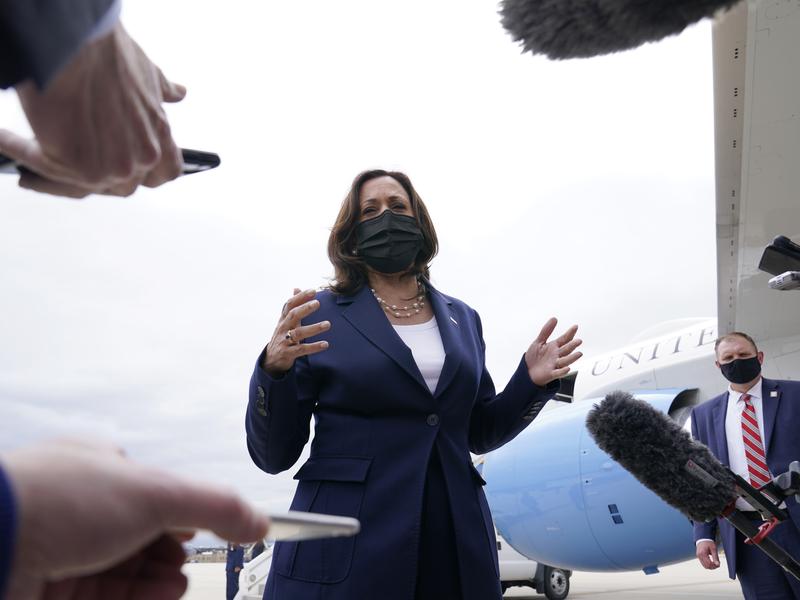Harris' Broadband Push Could Be Political Windfall — Or Pitfall

Vice President Harris has a big opportunity to shine with her latest assignment from President Biden: leading the White House push to expand broadband access. But it's a job that also comes with risks.
The pandemic has underscored the importance of having good internet, without which it became difficult to work from home, attend virtual classes, or stay in touch with family and friends. So there's momentum to deal with gaps in availability, and Biden said during his joint address to Congress last week that with Harris in charge, "I know it will get done."
The White House has asked Congress for $100 billion in funding so that all Americans will have access to affordable broadband.
It's a big challenge. More than 30 million Americans live in places without high-speed internet. The reasons for this are complicated. But it's partly because in areas where customers are more spread out, it's harder for providers to turn a profit.
Harris has compared the issue to federal efforts to provide electricity to rural areas in the early part of the 20th century.
"The world runs online, and yet millions of Americans, many of whom live in rural America, do not have access to broadband. And if they do, it is not affordable. Broadband impacts our economy. It impacts our education system, our health care system," Harris said last month.
Harris told reporters this week that she plans to listen to industry leaders about what's working on the ground now. She said she'll also work to reach a "reasonable consensus" in Congress about how to move forward.
The project gives Harris the chance to demonstrate her policy chops and negotiating skills to a broad national audience, said Joel Payne, a Democratic political strategist who worked on Hillary Clinton's 2016 campaign.
"This is a creative way to develop a real relationship between her brand and this issue that is going to be important to a lot of Americans," Payne said.
But making it work is critical, he said.
"If it goes well, great. If it does not go well, it certainly becomes a very sticky part of your resume that does not wash off easily," Payne said.
Achieving the White House goals will not be a simple task, said Tom Wheeler, who served as chairman of the Federal Communications Commission during the Obama administration.
"This is a deputizing of the vice president to do the things that are necessary so that we can actually move beyond the rhetoric ... to get to real policy," Wheeler said, noting that Harris had co-sponsored broadband legislation when she was a senator.
"All of these are complex, highly nuanced ... kinds of issues and are going to take someone with the skill and the subject matter understanding that Vice President Harris has," Wheeler said.
There has been bipartisan support in Congress for building out broadband networks, but the details of how to get it done are up for debate.
Republican Congressman Frank Lucas said slow internet has made it difficult for him to join video chats and webinars from his rural Oklahoma farm during the pandemic.
Lucas, who is one of the co-chairs of the House Rural Broadband Coalition, said he has not met with Harris yet, but he added: "I'll work with anybody. This is just too important in rural America."
Lucas and other lawmakers say they want to make sure the money goes to rural areas with no broadband coverage.
The White House broadband proposal is just one part of Biden's $2 trillion infrastructure plan.
Republican Congressman Bob Latta of Ohio said he's concerned about the size and scope of that larger package. He said he's committed to expanding broadband, but he questioned the price tag and how the funds would be distributed.
"If you leave [broadband funding] in the overall package right now, I think that's a real problem," Latta said.
9(MDEwODYxNTQyMDEzNjAxODk2Nzc2NzNmYQ001))